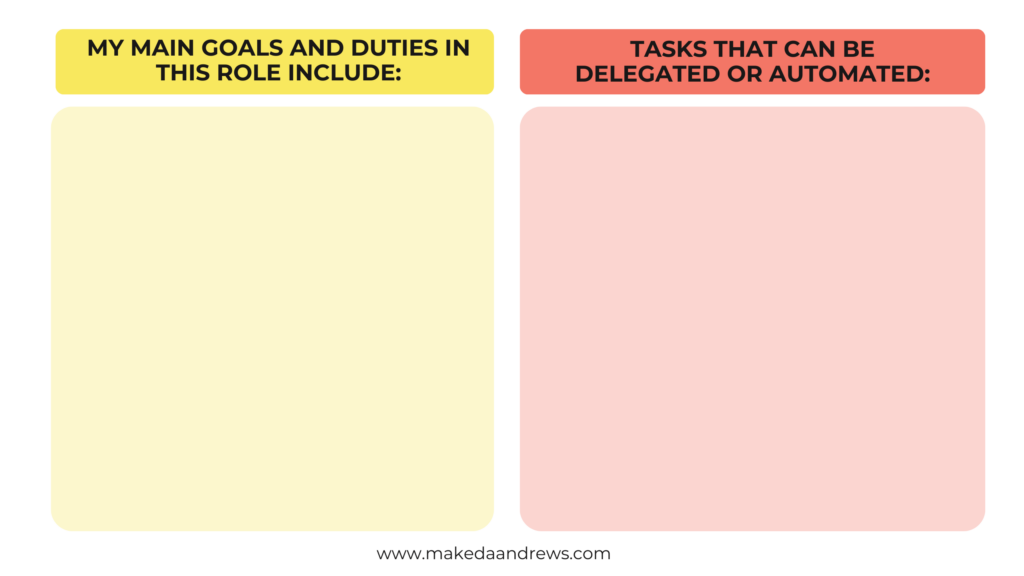Stress Management for Leaders – 4 Coping Strategies to Stay Balanced
Hi, I'm Mak. I'm a leadership coach for new managers who knows what it's like to be filled with overwhelm, self-doubt and terror that I’d let everyone down. My Story
FREE MICROCAST
How to Become an Effective Leader so You Can Build a High Performance Team
Learn how to delegate with confidence, navigate those tricky conversations (even for introverts!), and finally stop relying on Google to do your job.
Netflix < MakTV
THE YOUTUBE CHANNEL
No but really. This is the kinda content that’s actually healthy to binge. In fact, you become more of an awesomesauce manager with every video you watch.
I know I speak for all my fellow team leaders when I say managing a team can be incredibly stressful. Meeting deadlines, dealing with customers, leading people, and complying with your manager’s expectations can make you feel overwhelmed. But here’s the truth: to become a successful leader, you must find ways to deal with all this stress, mainly because it can end up affecting your work performance. That’s why I got inspired to share with you four coping skills for stress management as a team leader that work like a charm, so make sure to stick with me til the end!
But, before moving forward, make sure to equip yourself with the best information, starting with my FREE Guide: The Ultimate Team Leader Guide, where you’ll learn the five actionable steps new managers must take to gain clarity, build relationships, and lead their new teams effectively.
If you’re looking to uplevel in your leadership capacity, then check out our signature program, The New Manager Accelerator. NMA is our comprehensive step-by-step curriculum designed to help you develop the confidence and skills you need to become an effective and respected leader.
Stress Management as a Leader
It’s no secret that we’re going through an epidemic of stress. According to data collected by listwithclever.com, about 61% of Americans say their stress level is at an all-time high. Talk about some alarming statistics! When we don’t learn to deal with stress in a healthy way, it can lead to some scary consequences, such as:
- Burnout, that might impact your capacity to perform effectively.
- Decreased productivity, making it challenging for you to focus on one task at a time.
- Micromanagement, especially if you’re a Type A leader who loves control, stress might cause you to hover over every move of your team in an attempt to keep it all under your radar.
- Lack of innovation and continuous improvement, that will not allow you to fulfill your full leadership potential.
- Health issues that can affect your well-being and have a severe impact on your job.
Now, I don’t want to overwhelm or scare you with these facts but instead motivate you to do something about it. So, if you’re up for a challenge, let me show you how you can beat these statistics and apply some self-care as a team leader through these four techniques for stress management:
- Learning to be present
- Creating a mental whitespace.
- Asking for help
- Asking for what you need.
Let’s explore each one in detail.
1. Learn To Be Present.
Being a Type A Personality Leader often comes with the territory of having control and striving for excellence. However, if there’s something I’ve learned in my management journey, it is that you cannot control everything. In fact, there are always things that are out of your control, and you need to learn to be present to find the best solution.
Being present means trying to maintain calm amidst the chaos and focusing on getting concrete answers. When your mind is racing, the best thing you can do is to focus on the facts and ask yourself: “What is my next best move?”
Asking yourself this question aloud helps your brain process it, cutting through the noise of your thoughts and focusing on what truly matters. By being mindful, learning to be present, and focusing on solutions instead of problems, you can tackle one task at a time and pave the way for actual results.
2. Create Mental Whitespace.
In this fast-paced world of leadership, your mind can often become a cluttered battlefield. If this is your case, I recommend implementing this second strategy for staying grounded and managing stress: creating mental whitespace, which translates into having a clear, calm mind free from distractions. While this may seem like an impossible task, it can be done when you train your mind to focus on one thing at a time.
One of the most common techniques to achieve a mental whitespace is through journaling. By taking the time to write down your thoughts and concerns, you give yourself permission to feel and express yourself, gain clarity on the issues you’re facing, and find solutions to move forward. And it really works!
A few years ago, in one of my coaching sessions, I had a client who was experiencing constant stress as a team leader. After a few days of journaling, she discovered that her anxiety was a result of self-doubt and a lack of confidence. By facing these issues head-on, she was able to find ways to overcome them.
So, if you’re feeling like your mind is racing, take time to create for yourself mental whitespace. List all your concerns, aspirations, and everything in between. Jot down all your thoughts on paper, and you’ll gain a deeper understanding of what’s happening inside your mind.
I’m curious: have you tried journaling as a stress management technique? Share your experience in the comments below!

3. Ask for Help.
Here’s a truth bomb – If you try to do everything on your own, you’ll find it hard to do anything at all. Instead, rewire yourself to ask for help. I know at first it may not sound like an easy thing to do, but remember that no one expects you to be a super-manager. Instead, your role is to lead your team to achieve great results, starting with helping each team member to reach their full potential.
One of the ways you can do this is by delegating responsibility while communicating your expectations clearly. Don’t assume that your team can read your mind; instead, be transparent and provide all the necessary resources, such as information, tools, and communication.
Remember that even though you’re the manager and are there to assist and support every team member, asking for help is not a sign of weakness but a strength in realizing that you cannot do all of this on your own. So, take the proper steps for delegation to keep calm and deal with stressful situations.
4. Ask for What You Need
This last strategy adds up to asking for help in your role as a team leader.
One of the biggest lessons for me was learning that I didn’t need to know everything or be everything. So, don’t be scared to ask for the tools, resources, information, training, and mentorship you need. Leadership can be scary if you attempt to do it yourself. So equip yourself with the right tools to deal with stressful situations.
In my New Manager Accelerator Program, I teach my students a tried, true and tested roadmap to fulfill their potential as team leaders, so if you’re ready to have a mentor and a community of colleagues by your side, check out all the details here!
For this fourth strategy of asking what you need, I recommend using visual help, starting with opening a document and dividing it into two columns. In the first one, write down everything you’re responsible for and your role’s core objectives; in the second column, write down everything you’re doing and identify what you can delegate or automatize. Having a clear path for your actions can help you plan accordingly and make some progress instead of constantly being overwhelmed by what you didn’t do or the fires you need to put out.

Overall, I want you to remember that a balanced leader is a powerful leader. Learning the right techniques for stress management can help you improve your work environment. So don’t be afraid to take a pause; realize what’s going on, how it’s impacting your work, and what you can do for yourself and your mental health! Don’t forget to check out the NMA program to get the right mentorship for your new leadership role.
Share this article with a colleague who might need it and pin it here to get back to it when you need a reminder to focus on your well-being.
January 4, 2024
